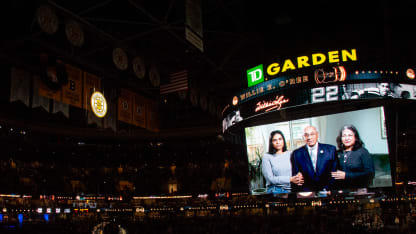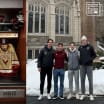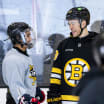O'Ree, the youngest of 13 children, adopted that mentality at a young age as his parents demanded that he and his siblings work hard, keep their grades up, and treat others the way they would like to be treated.
"That's basically the way I live," said O'Ree. "I've learned this from my parents, and I just use it in my daily life."
O'Ree gave further credit to his older brother, Richard, who he also called a friend and mentor.
"He'd be so honored, and he'd be so happy," said O'Ree. "He taught me a lot of things that I would need to know if I was going to choose hockey. He knew the type of individual I was, and the racism and prejudice and bigotry. He knew I could handle that, and he just said, forget about what other people think about you.
"If they can't accept you for the individual that you are, then that's their problem. Just go out and stay focused and work hard - and basically, that's what I tried to do every time I put on the Bruins jersey."
Some six decades later, O'Ree's legacy lives on within the Bruins dressing room.
"Providing opportunity for those that come after him, for really holding the torch and really just making the game a better, more inclusive place. So, so well deserved," Bruins blue liner Charlie McAvoy said of O'Ree's number retirement. "I feel lucky to have shared the same jersey as Willie."
Bruins captain Patrice Bergeron was thinking the same while he watched from the bench as O'Ree's No. 22 was hoisted to the TD Garden rafters.
"It's a special thing," said Bergeron. "It's the ultimate accomplishment to have your jersey retired. It's very well deserved. I think we were all trying to enjoy the moment and were honored to be a part of it. We could tell and see the joy and pride in Willie's face. I thought that was pretty special to be a part of that."
Bergeron, who is in the midst of his 18th season with the Black & Gold, is likely to one day see his No. 37 hanging in the rafters. But no such thought crossed his mind on Tuesday night. All the centerman could think of was how fortunate he is to be part of an organization with such a rich and proud history.
"Appreciating the history in this organization, realizing how special it is and how lucky we are to be a part of it," said Bergeron. "I was lucky enough to be part of Cam [Neely's] jersey retirement [in 2004], [Rick Middleton's in 2018], and now Willie. Not too many organizations do you have that opportunity and that history.
"We were honored to be a part of it, and happy for Willie. We've had a chance to meet him many times. He's given hope and inspired so many - a trailblazer.
"In that particular moment, we try to realize how special it is to be a Bruin."



















